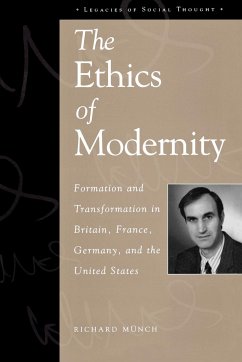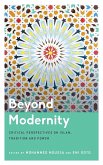Richard Münch
The Ethics of Modernity
Formation and Transformation in Britain, France, Germany, and the USA
Richard Münch
The Ethics of Modernity
Formation and Transformation in Britain, France, Germany, and the USA
- Broschiertes Buch
- Merkliste
- Auf die Merkliste
- Bewerten Bewerten
- Teilen
- Produkt teilen
- Produkterinnerung
- Produkterinnerung
Based on intensive, long-term study, this comparative book traces the role of ethics in the formation of modernity in four Western nations (the U.S., Britain, France, and Germany).
Andere Kunden interessierten sich auch für
![The Strauss-Krüger Correspondence The Strauss-Krüger Correspondence]() The Strauss-Krüger Correspondence74,99 €
The Strauss-Krüger Correspondence74,99 €![The Disintegrating Conscience and the Decline of Modernity The Disintegrating Conscience and the Decline of Modernity]() Steven D. SmithThe Disintegrating Conscience and the Decline of Modernity68,99 €
Steven D. SmithThe Disintegrating Conscience and the Decline of Modernity68,99 €![The Bourgeois and the Savage The Bourgeois and the Savage]() Alfonso Maurizio IaconoThe Bourgeois and the Savage55,99 €
Alfonso Maurizio IaconoThe Bourgeois and the Savage55,99 €![Reading George Grant in the 21st Century Reading George Grant in the 21st Century]() Reading George Grant in the 21st Century88,99 €
Reading George Grant in the 21st Century88,99 €![The Bourgeois and the Savage The Bourgeois and the Savage]() Alfonso Maurizio IaconoThe Bourgeois and the Savage55,99 €
Alfonso Maurizio IaconoThe Bourgeois and the Savage55,99 €![History of Political Ideas, Volume 5 (Cw23): Religion and the Rise of Modernity History of Political Ideas, Volume 5 (Cw23): Religion and the Rise of Modernity]() Eric VoegelinHistory of Political Ideas, Volume 5 (Cw23): Religion and the Rise of Modernity56,99 €
Eric VoegelinHistory of Political Ideas, Volume 5 (Cw23): Religion and the Rise of Modernity56,99 €![Beyond Modernity Beyond Modernity]() Beyond Modernity109,99 €
Beyond Modernity109,99 €-
-
-
Based on intensive, long-term study, this comparative book traces the role of ethics in the formation of modernity in four Western nations (the U.S., Britain, France, and Germany).
Hinweis: Dieser Artikel kann nur an eine deutsche Lieferadresse ausgeliefert werden.
Hinweis: Dieser Artikel kann nur an eine deutsche Lieferadresse ausgeliefert werden.
Produktdetails
- Produktdetails
- Legacies of Social Thought Series
- Verlag: Rowman & Littlefield Publishers
- Seitenzahl: 296
- Erscheinungstermin: 20. Dezember 2000
- Englisch
- Abmessung: 229mm x 152mm x 18mm
- Gewicht: 484g
- ISBN-13: 9780847699216
- ISBN-10: 0847699218
- Artikelnr.: 21701721
- Herstellerkennzeichnung
- Books on Demand GmbH
- In de Tarpen 42
- 22848 Norderstedt
- info@bod.de
- 040 53433511
- Legacies of Social Thought Series
- Verlag: Rowman & Littlefield Publishers
- Seitenzahl: 296
- Erscheinungstermin: 20. Dezember 2000
- Englisch
- Abmessung: 229mm x 152mm x 18mm
- Gewicht: 484g
- ISBN-13: 9780847699216
- ISBN-10: 0847699218
- Artikelnr.: 21701721
- Herstellerkennzeichnung
- Books on Demand GmbH
- In de Tarpen 42
- 22848 Norderstedt
- info@bod.de
- 040 53433511
By Richard Münch
Chapter 1 Introduction: The Western Culture of Instrumental Activism Part 2
Ethics and the World: A Comparative View Chapter 3 Magic Chapter 4 Archaic
Religion Chapter 5 Ethical Religion I: The Problem of Theodicy Chapter 6
Ethical Religion II: The Path to Salvation Chapter 7 Types of Relating
Ethics to the World Chapter 8 Structural Settings Shaping the Relationship
between Ethics and World Chapter 9 Different Patterns of Relating Ethics to
the World within Western Culture: Britain, France, Germany, and America
Part 10 From Ancient Judaism to Ascetic Protestantism Chapter 11
Introduction Chapter 12 Ethical Penetration of the World: Ancient Judaism
Chapter 13 From Ethno-Religious Particularism to the Universal Church: The
Teachings of Jesus Christ, the Pauline Mission, Early Catholicism, and the
Gregorian Ecclesiastical Reforms Chapter 14 From Traditionalistic Culture
to Modern Culture: The Medieval City and Scholasticism Chapter 15 The Last
Attempt at Reconciling Ethics and the World: St Thomas Acquinas' Organic
Social Ethics Chapter 16 The Mutual Penetration of Religious Ethics and
World: Ascetic Protestantism Chapter 17 Modernization as Ethical
Transformation Part 18 Britain: Tradition and Reform Chapter 19
Introduction Chapter 20 The Position of Religion in Society: Orthodox
Anglicanism and Heterodox Puritanism Chapter 21 Agents of Modernization:
Lawyers and Entrepreneurs in the Common Law Tradition Chapter 22 Inclusion
of Ethics in the Project of Modernization: Moderate Extension of Rights
through Representation Chapter 23 Social Change: The Interplay Between
Tradition and Modernity Part 24 France: Routine and Revolution Chapter 25
Introduction Chapter 26 The Position of Religion in Society: The Alliance
between the Catholic Church and the Absolutist Rule Chapter 27 Agents of
Modernization: The Administrative Elite Chapter 28 Inclusion of Ethics in
the Project of Modernization: Radical Intellectual Criticism Chapter 29
Social Change: The Cycle of Routine and Revolution Part 30 Germany:
Conformity and Alienation Chapter 31 Introduction Chapter 32 The Position
of Religion in Society: The Alliance between Protestant Church and Secular
Rule Chapter 33 Agents of Modernization: The Cooperation of State and
Industry Chapter 34 Inclusion of Ethics in the Project of Modernization:
The Gap between Ethics and World Chapter 35 Social Change: Between
Affirmation and Rejection Part 36 America: Continuity and Renewal Chapter
37 Introduction Chapter 38 The Position of Religion in Society: The Sacred
Covenant Chapter 39 Agents of Modernization: Moral, Political, and Economic
Entrepreneurs Chapter 40 Inclusion of Ethics in the Project of
Modernization: God's Envoys in the Wilderness Chapter 41 Social Change:
Continuity and Renewal Part 42 Ethics and World: A Comparative
Developmental History Chapter 43 Introduction Chapter 44 The Western
Culture of Instrumental Activism in Comparative View Chapter 45 From
Ancient Judaism to the Reformation Chapter 46 Modern Secularized Culture
Chapter 47 Differentiation of Cultural Traditions Chapter 48 Concluding
Remarks
Ethics and the World: A Comparative View Chapter 3 Magic Chapter 4 Archaic
Religion Chapter 5 Ethical Religion I: The Problem of Theodicy Chapter 6
Ethical Religion II: The Path to Salvation Chapter 7 Types of Relating
Ethics to the World Chapter 8 Structural Settings Shaping the Relationship
between Ethics and World Chapter 9 Different Patterns of Relating Ethics to
the World within Western Culture: Britain, France, Germany, and America
Part 10 From Ancient Judaism to Ascetic Protestantism Chapter 11
Introduction Chapter 12 Ethical Penetration of the World: Ancient Judaism
Chapter 13 From Ethno-Religious Particularism to the Universal Church: The
Teachings of Jesus Christ, the Pauline Mission, Early Catholicism, and the
Gregorian Ecclesiastical Reforms Chapter 14 From Traditionalistic Culture
to Modern Culture: The Medieval City and Scholasticism Chapter 15 The Last
Attempt at Reconciling Ethics and the World: St Thomas Acquinas' Organic
Social Ethics Chapter 16 The Mutual Penetration of Religious Ethics and
World: Ascetic Protestantism Chapter 17 Modernization as Ethical
Transformation Part 18 Britain: Tradition and Reform Chapter 19
Introduction Chapter 20 The Position of Religion in Society: Orthodox
Anglicanism and Heterodox Puritanism Chapter 21 Agents of Modernization:
Lawyers and Entrepreneurs in the Common Law Tradition Chapter 22 Inclusion
of Ethics in the Project of Modernization: Moderate Extension of Rights
through Representation Chapter 23 Social Change: The Interplay Between
Tradition and Modernity Part 24 France: Routine and Revolution Chapter 25
Introduction Chapter 26 The Position of Religion in Society: The Alliance
between the Catholic Church and the Absolutist Rule Chapter 27 Agents of
Modernization: The Administrative Elite Chapter 28 Inclusion of Ethics in
the Project of Modernization: Radical Intellectual Criticism Chapter 29
Social Change: The Cycle of Routine and Revolution Part 30 Germany:
Conformity and Alienation Chapter 31 Introduction Chapter 32 The Position
of Religion in Society: The Alliance between Protestant Church and Secular
Rule Chapter 33 Agents of Modernization: The Cooperation of State and
Industry Chapter 34 Inclusion of Ethics in the Project of Modernization:
The Gap between Ethics and World Chapter 35 Social Change: Between
Affirmation and Rejection Part 36 America: Continuity and Renewal Chapter
37 Introduction Chapter 38 The Position of Religion in Society: The Sacred
Covenant Chapter 39 Agents of Modernization: Moral, Political, and Economic
Entrepreneurs Chapter 40 Inclusion of Ethics in the Project of
Modernization: God's Envoys in the Wilderness Chapter 41 Social Change:
Continuity and Renewal Part 42 Ethics and World: A Comparative
Developmental History Chapter 43 Introduction Chapter 44 The Western
Culture of Instrumental Activism in Comparative View Chapter 45 From
Ancient Judaism to the Reformation Chapter 46 Modern Secularized Culture
Chapter 47 Differentiation of Cultural Traditions Chapter 48 Concluding
Remarks
Chapter 1 Introduction: The Western Culture of Instrumental Activism Part 2
Ethics and the World: A Comparative View Chapter 3 Magic Chapter 4 Archaic
Religion Chapter 5 Ethical Religion I: The Problem of Theodicy Chapter 6
Ethical Religion II: The Path to Salvation Chapter 7 Types of Relating
Ethics to the World Chapter 8 Structural Settings Shaping the Relationship
between Ethics and World Chapter 9 Different Patterns of Relating Ethics to
the World within Western Culture: Britain, France, Germany, and America
Part 10 From Ancient Judaism to Ascetic Protestantism Chapter 11
Introduction Chapter 12 Ethical Penetration of the World: Ancient Judaism
Chapter 13 From Ethno-Religious Particularism to the Universal Church: The
Teachings of Jesus Christ, the Pauline Mission, Early Catholicism, and the
Gregorian Ecclesiastical Reforms Chapter 14 From Traditionalistic Culture
to Modern Culture: The Medieval City and Scholasticism Chapter 15 The Last
Attempt at Reconciling Ethics and the World: St Thomas Acquinas' Organic
Social Ethics Chapter 16 The Mutual Penetration of Religious Ethics and
World: Ascetic Protestantism Chapter 17 Modernization as Ethical
Transformation Part 18 Britain: Tradition and Reform Chapter 19
Introduction Chapter 20 The Position of Religion in Society: Orthodox
Anglicanism and Heterodox Puritanism Chapter 21 Agents of Modernization:
Lawyers and Entrepreneurs in the Common Law Tradition Chapter 22 Inclusion
of Ethics in the Project of Modernization: Moderate Extension of Rights
through Representation Chapter 23 Social Change: The Interplay Between
Tradition and Modernity Part 24 France: Routine and Revolution Chapter 25
Introduction Chapter 26 The Position of Religion in Society: The Alliance
between the Catholic Church and the Absolutist Rule Chapter 27 Agents of
Modernization: The Administrative Elite Chapter 28 Inclusion of Ethics in
the Project of Modernization: Radical Intellectual Criticism Chapter 29
Social Change: The Cycle of Routine and Revolution Part 30 Germany:
Conformity and Alienation Chapter 31 Introduction Chapter 32 The Position
of Religion in Society: The Alliance between Protestant Church and Secular
Rule Chapter 33 Agents of Modernization: The Cooperation of State and
Industry Chapter 34 Inclusion of Ethics in the Project of Modernization:
The Gap between Ethics and World Chapter 35 Social Change: Between
Affirmation and Rejection Part 36 America: Continuity and Renewal Chapter
37 Introduction Chapter 38 The Position of Religion in Society: The Sacred
Covenant Chapter 39 Agents of Modernization: Moral, Political, and Economic
Entrepreneurs Chapter 40 Inclusion of Ethics in the Project of
Modernization: God's Envoys in the Wilderness Chapter 41 Social Change:
Continuity and Renewal Part 42 Ethics and World: A Comparative
Developmental History Chapter 43 Introduction Chapter 44 The Western
Culture of Instrumental Activism in Comparative View Chapter 45 From
Ancient Judaism to the Reformation Chapter 46 Modern Secularized Culture
Chapter 47 Differentiation of Cultural Traditions Chapter 48 Concluding
Remarks
Ethics and the World: A Comparative View Chapter 3 Magic Chapter 4 Archaic
Religion Chapter 5 Ethical Religion I: The Problem of Theodicy Chapter 6
Ethical Religion II: The Path to Salvation Chapter 7 Types of Relating
Ethics to the World Chapter 8 Structural Settings Shaping the Relationship
between Ethics and World Chapter 9 Different Patterns of Relating Ethics to
the World within Western Culture: Britain, France, Germany, and America
Part 10 From Ancient Judaism to Ascetic Protestantism Chapter 11
Introduction Chapter 12 Ethical Penetration of the World: Ancient Judaism
Chapter 13 From Ethno-Religious Particularism to the Universal Church: The
Teachings of Jesus Christ, the Pauline Mission, Early Catholicism, and the
Gregorian Ecclesiastical Reforms Chapter 14 From Traditionalistic Culture
to Modern Culture: The Medieval City and Scholasticism Chapter 15 The Last
Attempt at Reconciling Ethics and the World: St Thomas Acquinas' Organic
Social Ethics Chapter 16 The Mutual Penetration of Religious Ethics and
World: Ascetic Protestantism Chapter 17 Modernization as Ethical
Transformation Part 18 Britain: Tradition and Reform Chapter 19
Introduction Chapter 20 The Position of Religion in Society: Orthodox
Anglicanism and Heterodox Puritanism Chapter 21 Agents of Modernization:
Lawyers and Entrepreneurs in the Common Law Tradition Chapter 22 Inclusion
of Ethics in the Project of Modernization: Moderate Extension of Rights
through Representation Chapter 23 Social Change: The Interplay Between
Tradition and Modernity Part 24 France: Routine and Revolution Chapter 25
Introduction Chapter 26 The Position of Religion in Society: The Alliance
between the Catholic Church and the Absolutist Rule Chapter 27 Agents of
Modernization: The Administrative Elite Chapter 28 Inclusion of Ethics in
the Project of Modernization: Radical Intellectual Criticism Chapter 29
Social Change: The Cycle of Routine and Revolution Part 30 Germany:
Conformity and Alienation Chapter 31 Introduction Chapter 32 The Position
of Religion in Society: The Alliance between Protestant Church and Secular
Rule Chapter 33 Agents of Modernization: The Cooperation of State and
Industry Chapter 34 Inclusion of Ethics in the Project of Modernization:
The Gap between Ethics and World Chapter 35 Social Change: Between
Affirmation and Rejection Part 36 America: Continuity and Renewal Chapter
37 Introduction Chapter 38 The Position of Religion in Society: The Sacred
Covenant Chapter 39 Agents of Modernization: Moral, Political, and Economic
Entrepreneurs Chapter 40 Inclusion of Ethics in the Project of
Modernization: God's Envoys in the Wilderness Chapter 41 Social Change:
Continuity and Renewal Part 42 Ethics and World: A Comparative
Developmental History Chapter 43 Introduction Chapter 44 The Western
Culture of Instrumental Activism in Comparative View Chapter 45 From
Ancient Judaism to the Reformation Chapter 46 Modern Secularized Culture
Chapter 47 Differentiation of Cultural Traditions Chapter 48 Concluding
Remarks








